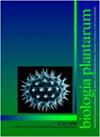Screening of transcription factors related to flower and fruit development by differential gene analysis in Lycium species
IF 0.9
4区 生物学
Q4 PLANT SCIENCES
引用次数: 0
Abstract
Lycium barbarum Thunb. and Lycium ruthenicum Murray (wolfberries) have been utilized as traditional medicinal and nutritional plants in China for centuries. Much research has been focused on their high quality, yet the molecular mechanisms underlying morphological differences remain unclear. In this study, a comparative analysis of morphological and cytological characteristics indicated that significant differences existed. Meanwhile, transcriptomic analyses of the flower and fruit were performed at different developmental stages, and a total of 54 795 differentially expressed genes (DEGs) were screened. Gene Ontology and Kyoto Encyclopedia of Genes and Genomes analyses showed that these DEGs were significantly enriched in substance metabolism, catalytic activity, single organism process, starch and sucrose metabolism, carotenoid biosynthesis, amino sugar and nucleotide sugar metabolism, phenylpropanoid biosynthesis, and other pathways. Based on these significantly enriched pathways, the ratio between nonsynonymous and synonymous substitution rates (Ka/Ks), and numerous studies related to flower and fruit development, we preliminarily screened eight transcription factor families related to flower and fruit development and counted the number of potential transcription factor genes. These candidate genes could provide a basis for future functional verification, helping to further research on the molecular mechanism of morphological differences in the two Lycium species.利用差异基因分析筛选枸杞花、果发育相关转录因子
枸杞。枸杞(枸杞)在中国被用作传统的药用和营养植物已有几个世纪的历史。大量的研究集中在它们的高质量上,但形态学差异的分子机制尚不清楚。在本研究中,形态学和细胞学特征的比较分析表明存在显著差异。同时,对不同发育阶段的花和果实进行转录组学分析,共筛选到54 795个差异表达基因(deg)。基因本体和京都基因与基因组百科分析表明,这些deg在物质代谢、催化活性、单生物过程、淀粉和蔗糖代谢、类胡萝卜素生物合成、氨基糖和核苷酸糖代谢、苯丙素生物合成等途径中显著富集。基于这些显著富集的通路、非同义和同义替代率之比(Ka/Ks)以及大量与花和果实发育相关的研究,我们初步筛选了8个与花和果实发育相关的转录因子家族,并统计了潜在转录因子基因的数量。这些候选基因可以为未来功能验证提供基础,有助于进一步研究两种枸杞形态差异的分子机制。
本文章由计算机程序翻译,如有差异,请以英文原文为准。
求助全文
约1分钟内获得全文
求助全文
来源期刊

Biologia Plantarum
生物-植物科学
CiteScore
2.80
自引率
0.00%
发文量
28
审稿时长
3.3 months
期刊介绍:
BIOLOGIA PLANTARUM is an international journal for experimental botany. It publishes original scientific papers and brief communications, reviews on specialized topics, and book reviews in plant physiology, plant biochemistry and biophysics, physiological anatomy, ecophysiology, genetics, molecular biology, cell biology, evolution, and pathophysiology. All papers should contribute substantially to the current level of plant science and combine originality with a potential general interest. The journal focuses on model and crop plants, as well as on under-investigated species.
 求助内容:
求助内容: 应助结果提醒方式:
应助结果提醒方式:


